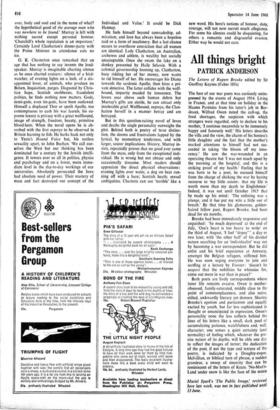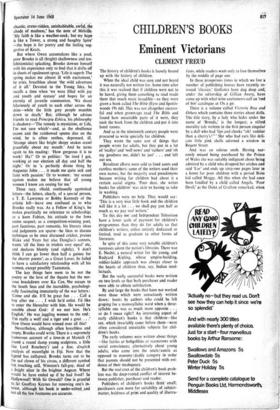All things bright
PATRICK ANDERSON
The Letters of Rupert Brooke edited by Sir Geoffrey Keynes (Faber 105s) The best of our war poets was curiously unim- pressed by the events of August 1914. Living in France, and at that time on holiday in the Hautes Pyrenees from his tutor's job in Bor- deaux, Wilfred Owen noted the call-up, the food shortages, the suspicion with which strangers were regarded, only to declare to his mother, 'I continue meanwhile to be immensely happy and famously well.' His letters describe the villa and the view, the charm of his hostess's little daughter and the fact that the mother's marked attentions to himself had not suc- ceeded in taking 'the bloom off my inno- cency.' He saw the war-wounded in an operating theatre but 'I was not much upset by the morning at the hospital; and this is a striking proof of my health.' Feeling that he was born to be a poet, he excused himself from the charge of shirking the war by having recourse to 'my little axiom : that my life is worth more than my death to Englishmen.' Indeed, it was not until October 1915 that he made up his mind: 'The enlisting was a plunge, and it has put my wits a little out of breath.' By that time his glamorous, golden- haired fellow poet, Rupert Brooke, had been dead for six months.
Brooke had been immediately responsive and anguished : 'So much depressed' at the end of July, 'One's heart is too heavy to write' on the third of August, 'I feel "dopey"' a day or two later, with 'the other half' of his divided nature searching for an 'individualist' way out by becoming a war correspondent. But he did enlist and his brief experience at Antwerp, amongst the Belgian refugees, stiffened him. He was soon urging everyone to • join and scoffing at a lecture by Forster: 'doesn't he • suspect that the nobilities he whinnies for, come out more in war than in peace?'
Both poets are lively correspondents whose inner life remains evasive. Owen is mother- obsessed, family-saturated, middle class to the point of commonplaceness, and also naive, stilted, awkwardly literary yet demure. Sharing Brooke's egotism and puritanism and equally excited by youth, but far less sophisticated in thought or emancipated in expression, Owen's personality none the less collects behind the lines of his letters like a small, dark pool of accumulating patience, watchfulness and, well, character; one senses a quiet certainty (and normality) of feeling which, whatever the pre- cise nature of its depths, will be able one day to reflect the images of terror; the dedication of the poet, if not the type and texture of the poetry, is indicated by a Doughty-esque, Melvillian, or biblical turn of phrase, a sudden grandeur, a sweep of sincerity that can be reminiscent of the letters of Keats. Islo-Man's- Land under snow is like the face of the moon Muriel Spark's 'The Public Image,' reviewed here last week, was not in fact published until 13 lune.
chaotic, crater-ridden, uninhabitable, awful, the abode of madness,' has the note of Melville. `My faith is like a weather-cock; but my hope is like a Tower, a strong and haughty Spire' —the hope is for poetry and the feeling sug- gestive of Keats.
But where Owen accumulates like a pool, poor Brooke is all (bright) shallowness and (ex- hibitionistic) splashing. Brooke dowses himself with his experience only to find that it drifts off in sheets of opalescent spray. 'Life is superb. The spring makes me almost ill with excitement,' he cries, breathless about 'the wild adventure of it all.' Devoted to the Young Idea, he recalls a time when 'we were filled with joy and youth and ecstasy' and hopes for an eternity of juvenile communion, 'We shout hilariously of youth to each other across the skies—while the little grey people mumble down to death.' But, although he advises friends to read Principia Ethica, his philosophy is shadowy—`The remedy is mysticism, or Life, I'm not sure which'—and, as the ebullience ceases and the rainbowed spume dies on the wind, he is often restless, depressed, ill. `Strange ulcers like bright sleepy snakes crawl gracefully about my mouth.' And he turns again to his reading : 'How gorgeous it is to work ! Ha!' Or to politics: `So tired I got, working at our election all day and half the night.' Or to 'a perfectly divine thing by Augustus John . . it made me quite sick and faint with passion.' Or to women: 'my sexual egoism makes me believe that all young women I know are oozing for me.'
These racy, ribald, confessedly egotistical letters—the letters, clearly, of a special person, a T. E. Lawrence or Bobby Kennedy of the artistic left—leave one confused as to who Brooke really was. As a Fellow of King's, he makes practically no reference to scholarship; as a keen Fabian, his attitude to the Jews seems suspect; as a competition-winning poet, part facetious, part romantic, his literary ideas and judgments are sparse—he likes to discuss technique as he once discussed cricket, praises Blake and Yeats but also Douglas's sonnets, wants 'all the lines in triolets very equal' etc, and declares bluntly (and rightly), 'I don't think I can go lower than half a guinea for the shorter poems'; as a Great Lover, he failed to have a satisfactory relationship with all his women, except possibly Taatamata.
The key things here seem to be not the poetry or the love of the theatre but the ner- vous breakdown over Ka Cox, the escape to the South Seas and the incredible, psychologi- cally fascinating immaturity of the war letters: `Come and die. It'll be great fun . . Call a boy after me . . . I wish he'd enlist. I'd like to enter the Hereafter with him. He would be sensible about God : if we met him. He's English.' He was juggling women to the end: 'I'm really a wolf and a tiger and a goat. .. How Owen would have winced over all this!
Nevertheless, although often breathless and empty, Brooke could write. There is a supremely humorous account of a love-in at Munich CI
found a round damp young sculptress, a little like Lord Rosebery') and a fine, dinglich
analysis of moonlight in Fiji. Now that the
legend has collapsed, Brooke turns out to be the sad clown of his circus, a different symbol
but touching still, Winston's fall-guy, dead of a bright ulcer in the brighter Aegean. Where would he have ended up if he had lived? In Hollywood? With Sir Oswald? One is grateful to 4ir Geoffrey Keynes for renewing one's in- terest, although his book is under-editekand not all the few footnotes are accurate.











































 Previous page
Previous page